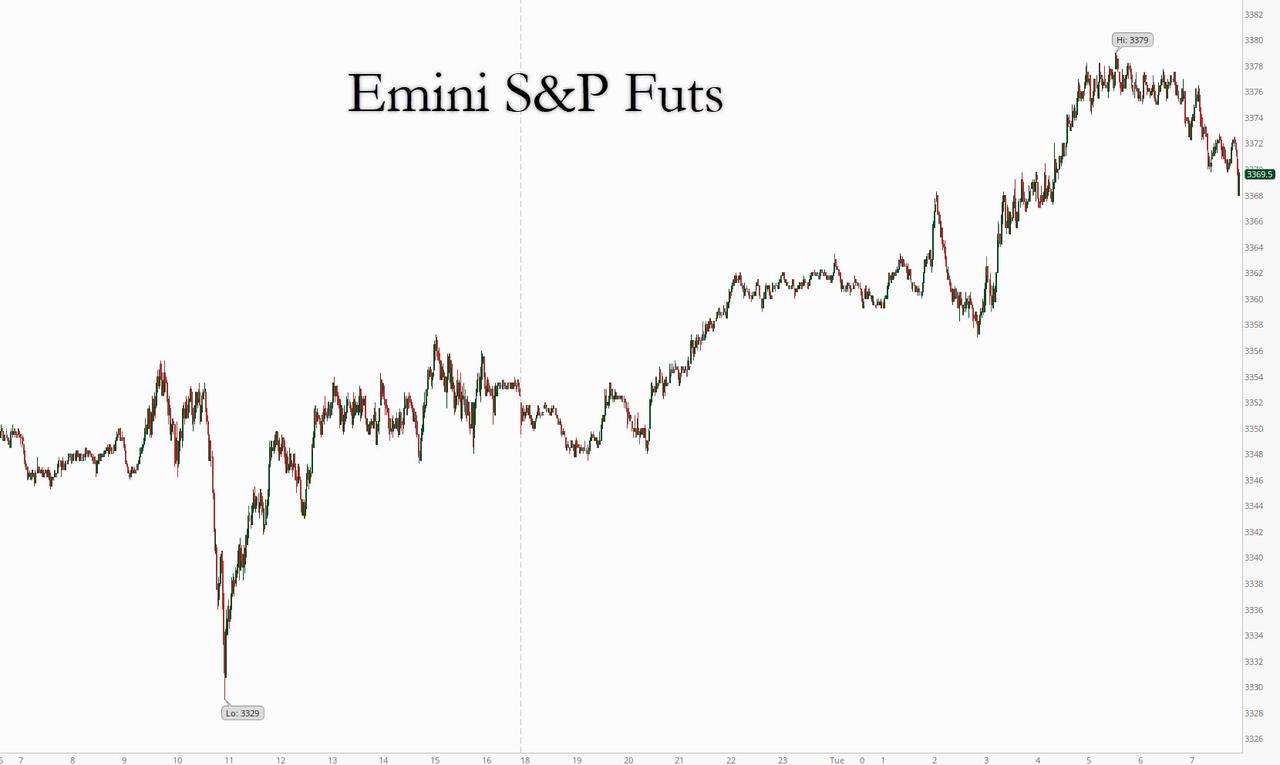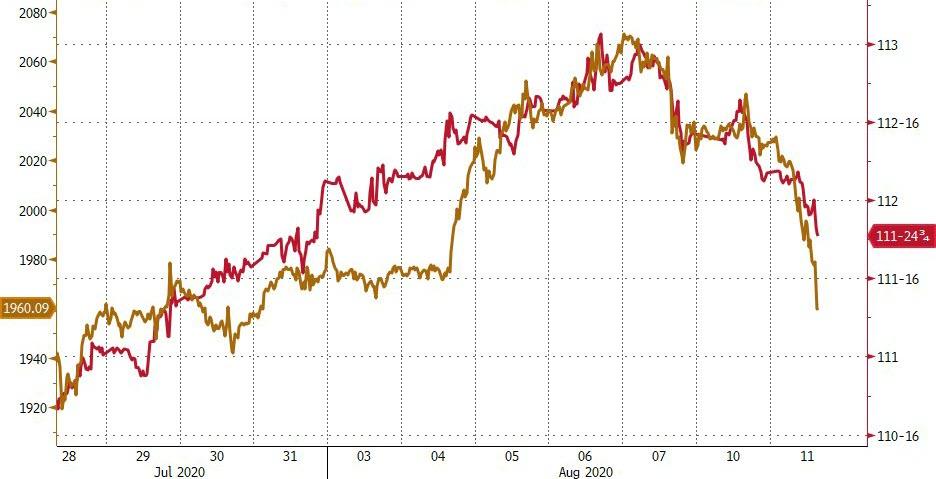S&P 500 futures hit a record high as investors shrugged off continuing U.S.-China tensions and instead focused on news of an approved, if largely unclear, Russian vaccine, and more stimulus optimism as President Donald Trump said he’s considering a tax cut on capital gains. According to Reuters calculations at the current levels, the benchmark index is set to open about 12 points below its Feb. 19 record peak of 3,393.52.

American Airlines and Carnival led a boom in travel shares in the premarket. The S&P 500 closed less than 1% below its record high on Monday as investors extended a rotation into value stocks from heavyweight tech-related names. At 8:00 a.m. ET, S&P 500 e-minis were up 23.25 points, or 0.69%, topping an all-time high of 3,372.25 points last hit on Feb. 20.
A rally in the tech megacaps including Amazon.com, Netflix and Apple that thrived during the shutdowns helped the Nasdaq reclaim its all-time high in June, while the Dow still remains about 6% below its peak.
“Equity has never looked cheaper compared to fixed income and the like,” Jun Bei Liu, portfolio manager at Tribeca Investment Partners, said in a Bloomberg TV interview. “If you want any return, any yield, any income or even any growth you have to go to equities.”
In Europe and Asia, a broad rally from industrial goods to health-care shares set the Stoxx Europe 600 Index headed for its best increase since mid-June. The Stoxx 600 Europe index rose more than 2% , with auto shares leading the way after a surge in Chinese car sales. The Stoxx 600 Travel & Leisure Index jumps as much as 4.8%, to the highest since June 11, amid investor optimism about the development of a vaccine for the coronavirus and after InterContinental Hotels said it is seeing some very early signs of improvement as traveller confidence returns, sending its stock up 6.1%. The subgroup was among the biggest advancers in Europe’s Stoxx 600 Index, which is up 2.1% after President Vladimir Putin said Russia has registered its first Covid-19 vaccine, though some pharmaceutical companies have called Russia’s rushed registration dangerous. Airline stocks also rose: IAG +7.8%, EasyJet +6.5%, Lufthansa +4.7%, Ryanair +4%, Turkish Airlines +8%.
Earlier in the session, Asian shares ex-Japan gained nearly 1%, with Japan’s Nikkei rising 1.9% after a Monday holiday. There were hopes Beijing’s sanctions on 11 U.S. citizens may end this round of tit-for-tat moves between the two powers.
“It has left the White House untouched,” said Vishnu Varathan, head of economics at Mizuho Bank in Singapore. “That gives some relief that China is still giving some priority to the (trade deal) dialogue,” he said.
Elsewhere, the resignation of Lebanon’s government after the devastating explosion in Beirut threatened to upend prospects of a debt restructuring deal in the next few months.
Market participants remain eager to see an agreement on the fifth federal aid bill to help Americans battle with the health crisis was far from over with U.S. cases surpassing 5 million last week. The mood remains cautious as sparring continues in the U.S. Congress over extending fiscal stimulus while economic data such as a steep drop in South Korean exports and a rise in UK jobless rates remain a cause for concern. But upbeat comments by U.S. Treasury Secretary Steven Mnuchin on the prospects for a bipartisan stimulus deal supported Brent crude futures at near five-month highs and kept the dollar index near a one-week peak.
Commerzbank analysts said markets were shrugging off doubts over the legality of Trump’s order and appeared convinced Congress would agree a deal
“Not without good reason, because in the election campaign both parties have an interest in presenting themselves well,” they said. “Who wants to be seen as the stingy bad guy even in times of great need?”
General optimism kept safe haven assets under gentle pressure, with gold falling back under $2000 an ounce, down more than 2%, even as the dollar slumped. Precious metals dropped with spot gold south of $2000 and spot silver just about holding onto a USD 28/oz handle having briefly dipped below the figure. No fundamental news flow coincided with the losses across precious metals but action could merely be a function of tech play alongside some profit taking/stops being triggered. But the most likely reason for the back down in gold prices is that 10Y real rates – which gold has been tracking tick for tick – also dipped from recent record lows.

In FX, the dollar slipped as European stocks follow Asian equities higher, with markets taking encouragement from falling hospitalization rates in California and New York and decreasing new infections in Hong Kong. The euro rose as much as 0.5% after ZEW data revealed investors raised their expectations of a rebound for the German economy in August. Italy’s 10-year yield premium over its German equivalent tightened to its lowest level since February.
In rates, ten-year U.S. Treasury yields were near a two-week high of 0.5870% while German yields likewise rose to two-week highs. Treasury yields were cheaper by 1bp to 2.5bp across the curve led by long end, steepening 2s10s, 5s30s by 1.6bp and 1bp; 10-year yields around 0.60% while bunds, gilts both lag by ~1bp. Ahead of 3-year auction, WI yield is ~0.160%, 3bp richer than July’s record low stop at 0.19%; refunding includes $38b 10-year Wednesday and $26b 30-year Thursday; all sizes are records.
In commodities, WTI and Brent continue to grind higher in early trade, with upside more-so a function of the overall risk tone as opposed to fresh fundamental catalysts, albeit prices remain underpinned by the recent upbeat assessment from Saudi, Iraq and Gulf members alongside the constructive outlook by Saudi Aramco post-earnings. Looking ahead, traders will be eyeing the weekly API inventory release, with expectations for crude stockpiles to decline by almost 4mln barrels, but ahead of the weekly release, participants will pay attention to the EIA Short Term energy Outlook which will include US crude production forecasts for the rest of 2020 and 2021. In terms of base metals, Dalian iron ore futures snapped its two-day losing streak as prices were bolstered by falling portside inventories, whilst LME copper prices saw early downside.
Looking at the day ahead, and data releases out include UK unemployment data for June, the German ZEW survey for August, as well as July’s PPI reading and the NFIB small business optimism index from the US. Otherwise, Fed speakers today include Barkin, Daly and Brainard.
Market Snapshot
- S&P 500 futures up 0.6% to 3,371.75
- STOXX Europe 600 up 1.8% to 371.07
- MXAP up 1.1% to 169.75
- MXAPJ up 0.6% to 562.38
- Nikkei up 1.9% to 22,750.24
- Topix up 2.5% to 1,585.96
- Hang Seng Index up 2.1% to 24,890.68
- Shanghai Composite down 1.2% to 3,340.29
- Sensex up 0.9% to 38,507.25
- Australia S&P/ASX 200 up 0.5% to 6,138.65
- Kospi up 1.4% to 2,418.67
- German 10Y yield rose 1.3 bps to -0.513%
- Euro up 0.3% to $1.1768
- Brent Futures up 0.8% to $45.33/bbl
- Italian 10Y yield fell 0.8 bps to 0.795%
- Spanish 10Y yield fell 0.2 bps to 0.253%
- Brent Futures up 0.8% to $45.33/bbl
- Gold spot down 2.1% to $1,985.04
- U.S. Dollar Index down 0.2% to 93.44
Top Overnight News from Bloomberg
- Britain’s mounting labor market crisis was underscored by a 220,000 slump in employment during the height of the coronavirus lockdown, the worst decline since the global financial crisis
- Even as China continues to hit back at the Trump administration, leaders in Beijing are also signaling they want to ease tensions with the U.S. as the clock ticks down to the presidential election
- Lebanon’s political leaders are expected to launch parliamentary consultations to choose a new prime minister after Hassan Diab’s government resigned on Monday over the devastating explosion at Beirut’s port
- Hong Kong’s worst coronavirus outbreak is showing signs of coming under control as the city reported the lowest number of new local infections since its resurgence began over a month ago
A quick look at global markets courtesy of NewsSquawk:
Asian equity markets traded higher as risk appetite in the region improved on the tepid performance seen on Wall St where most major indices finished in the green but tech underperformed and indecision lingered amid the ongoing stimulus talks stalemate, mixed views on President Trump’s recent executive orders and ongoing US-China tensions. ASX 200 (+0.5%) was positive as top-weighted financials spearheaded the advances and with the broad sector gains offsetting the weakness in gold miners and tech, while Nikkei 225 (+1.8%) was buoyed on return from an extended weekend helped by a predominantly weaker currency and after bank lending increased by its fastest pace on record. Hang Seng (+2.1%) and Shanghai Comp. (-1.2%) conformed to the upbeat mood after the PBoC upped its liquidity efforts with a CNY 50bln reverse repo injection and although China announced sanctions against officials in retaliation to US sanctions on Hong Kong, they refrained from imposing them on Trump administration officials. Furthermore, casino stocks are red-hot after reports China is to remove the quarantine requirement for Macau effective tomorrow and Next Digital shares surged over 400% in an extension of yesterday’s sharp intraday turnaround as activists piled into the shares in a show of support following the founder’s recent arrest and amid speculation it could sell its listed entity as a shell for other firms to acquire for a back-door listing. Finally, 10yr JGBs were lower and approached 152.00 to the downside as they played catch up to the recent weakness in T-notes and as havens were shunned amid gains in riskier assets, while the lack of BoJ presence in the market also added to the dampened mood for JGBs.
Top Asian News
- One of World’s Strongest Rallies Propels Kospi to Two-Year High
- Tough-to-Impress Harvard Grad Molds Fortunes of China’s Rich
- Singapore’s Economy Posts Worse Contraction in Second Quarter
- Iron Ore Futures Gain as China’s Economic Recovery Fuels Demand
European equities trade higher across the board [Euro Stoxx 50 +2.7%], with upside accelerating after the cash open as sentiment improved following an initially bleak APAC handover – prompting DAX cash and Sept futures to gain above 13k, albeit fresh fundamental catalysts remain light throughout the session thus far; some modest impetus coincided with vaccine updates from Russia. Firm gains are also seen across all European sectors, with cyclicals/value clearly outpacing defensives, whilst the breakdown paints a similarly performance, with Travel & Leisure topping the chart, closely followed by Oil & Gas, Autos and Banks, whilst the other side of the spectrum sees Healthcare and Chemicals as the laggards. In terms of individual movers, UK listed Cineworld (+17%) extended on earlier gains and resides at the top of the Stoxx 600 amid reports that the group could go private. BP (+3.7%) coattails on the back of firmer energy prices coupled with source reports the group is said to be mulling the sale of its German chemicals’ unit DHC Solvent Chemie. Mediobanca (+5.9%) extends on opening gains after the ECB gave the green-light for shareholder Del Vecchio to increase his stake in the Co. to 13-14% from 10%.
Top European News
- Hungary Inflation Surges, Putting Rate Policy Back in Focus
- U.K. Jobs Crisis Worsens as Employment Drops Most Since 2009
- Vestas Shares Surge as 2020 Revenue Guidance Reintroduced
- Unilever Warns of Dutch Tax Proposal’s Risk for Plan to Move
In FX, another back up in US Treasury yields and mild steepening along the curve into record refunding has underpinned the Dollar to a degree, but a deeper retracement in spot bullion to test support around the psychological Usd 2000/oz level coincided with the DXY marginally eclipsing Monday’s high at 93.729. However, the Greenback has lost momentum against the backdrop of extended gains in global equities that is keeping high beta/cyclical currencies supported and safe-haven demand suppressed.
- AUD/NZD/CAD/NOK – As noted above, the Aussie is benefiting from bullish risk sentiment to the extent that declines in NAB business sentiment and conditions have not weighed on Aud/Usd unduly, while the Kiwi is just keeping tabs with 0.6600 ahead of Wednesday’s RBNZ policy meeting even though the bias may be skewed towards a more dovish event compared to the prior assessment and guidance, while NZ reports a local outbreak of COVID-19 cases after a 100+ day run of no infections at all. Elsewhere, elevated crude prices are helping the Loonie and Norwegian Crown remain afloat around 1.3300 and 10.5800 vs the Buck and Euro respectively, with the former now looking for some independent impetus via Canadian housing starts.
- EUR/CHF/GBP – All benefiting from the aforementioned Dollar fade, with the index now back under 93.500 again and Euro rebounding between 1.1723-83 parameters following a somewhat mixed ZEW survey, the Franc paring losses within a 0.9168-34 range and Pound maintaining 1.3050+ status, but not quite able to retest yesterday’s best a few pips over 1.3100 in wake of mostly weaker than forecast UK labour and pay data.
- JPY – The Yen is marginally underperforming either side of 106.00 on a loss of safety premium and with Japanese markets back from their long holiday weekend, but little lasting reaction to a wider than anticipated Japanese current account surplus.
- EM – Oil’s ongoing resurgence is helping the Rouble and Mexican Peso supplement gains vs the flagging Greenback. but the SA Rand has not been deterred by Gold’s meltdown or looming data and has breached key technical resistance in the form of the 100 DMA (17.6240) on the way up towards 17.5400. Similarly, the Turkish Lira is back in recovery mode as tighter CBRT funding conditions prompt some short covering, while Brazil’s Real awaits BCB COPOM minutes from the last meeting.
In commodities, WTI and Brent front-month futures continue to grind higher in early trade, with upside more-so a function of the overall risk tone as opposed to fresh fundamental catalysts, albeit prices remain underpinned by the recent upbeat assessment from Saudi, Iraq and Gulf members alongside the constructive outlook by Saudi Aramco post-earnings. The benchmarks experienced modest downside heading into the European cash open, in which prices briefly dipped below 45/bbl for the Brent Oct contract, whilst WTI Sep tested 42/bbl, before recovering lost ground and some more. Looking ahead, traders will be eyeing the weekly Private Inventory release, with expectations for crude stockpiles to decline by almost 4mln barrels, but ahead of the weekly release, participants will pay attention to the EIA Short Term energy Outlook which will include US crude production forecasts for the rest of 2020 and 2021. Elsewhere, precious metals are under pressure this morning with spot gold south of USD 2000/oz and spot silver just about holding onto a USD 28/oz handle having briefly dipped below the figure. No fundamental news flow coincided with the losses across precious metals but action could merely be a function of tech play alongside some profit taking/stops being triggered. In terms of base metals, Dalian iron ore futures snapped its two-day losing streak as prices were bolstered by falling portside inventories, whilst LME copper prices saw early downside amid the firming USD at the time; albeit, has since nursed losses.
- 6am: NFIB Small Business Optimism 98.8, est. 100.5, prior 100.6
- 8:30am: PPI Final Demand MoM, est. 0.3%, prior -0.2%; PPI Ex Food and Energy MoM, est. 0.1%, prior -0.3%
- 8:30am: PPI Final Demand YoY, est. -0.7%, prior -0.8%; PPI Ex Food and Energy YoY, est. 0.0%, prior 0.1%
DB’s Jim Reid concludes the overnight wrap
The last 24 hours has pretty much fit the bill as far as slow news days are concerned in markets. That being said there was a somewhat notable milestone reached yesterday as the S&P 500 surpassed the all-time highs from February on a total return basis. This is a fairly astonishing feat when you consider that in late-March the index was down as much as -33.79% from those highs. In price terms it finished +0.27% yesterday which means it’s just -0.76% lower than its all-time closing high. That move also marked the S&P’s 7th consecutive advance for the first time since April 2019.
While the S&P nudged higher, the Dow Jones saw a much larger +1.30% gain, which is somewhat unusual given the strong correlation between the two indices. Indeed, it’s only the 6th time in the last decade that the Dow’s daily move has been more than one percentage point different to the S&P’s (even if 5 of them have been since the pandemic hit). At the other end of the spectrum though, the NASDAQ (-0.39%) slipped for a rare second consecutive session. At the margin the macro news acted as a bit of headwind and included the news of further Chinese sanctions on US officials after similar measures were announced by the US on Friday, with those sanctioned by China including the Republican senators Marco Rubio, Ted Cruz and Tom Cotton. Chinese Foreign Ministry spokesman Zhao Lijan said yesterday that “China has decided to impose sanctions on those individuals who behaved badly on Hong Kong-related issues”. And in a further sign that US-China tensions are showing no sign of abating any time soon, US Secretary of State Mike Pompeo tweeted yesterday that the arrest of Jimmy Lai under Hong Kong’s national security law was “further proof that the CCP has eviscerated Hong Kong’s freedoms and eroded the rights of its people.”
Meanwhile, markets continue to turn a bit of a blind eye to the lack of any progress on the next US fiscal package with no updates to report of yesterday. Nevertheless there was some more positive coronavirus news from the US, with the number of hospitalisations in New York State at the lowest since the start of the pandemic, and the number of cases in Florida at their lowest in over 6 weeks. California and Texas also reported a fall in hospitalizations. Overall, cases in the US grew by 44,647 in last 24 hours or +0.9% while at the same point last week cases had grown by 46,918 or 1.0%. Globally, the number of cases have crossed the 20 million mark. It is worth highlighting that it took 6 months for cases to reach 10 million after the first infection surfaced in China while the second 10 million took only 6 weeks. On the positive side, China has said that it will resume issuing tourist visas for visitors to Macau which has helped casino stocks rally in the region.
Indeed most Asian bourses have posted strong gains this morning. The Hang Seng (+2.40%) has led the way after underperforming on Monday, while the Nikkei (+1.81%) is up following Monday’s holiday. The Kospi (+1.60%) and ASX (+0.84%) all also up while futures on the S&P 500 are also up +0.26%. It’s been fairly quiet for overnight news, however President Trump did say that he’s “very seriously” considering a capital gains tax cut “which would create a lot more jobs”.
Back to yesterday, and over in Europe the moves were pretty similar to the US in terms of the upward direction for equities, though the STOXX 600 (+0.30%) still remains nearly 16% beneath its own record high in February, with European indices having underperformed their US counterparts since the pandemic hit. Energy stocks led the rally on both sides of the Atlantic thanks to a strong performance in oil prices, and both WTI (+1.75%) and Brent (+1.33%) saw solid gains. Staying with the commodities sphere, it’s worth noting that silver was up +2.93% at a 7-year high of $29.13/oz yesterday, though gold (-0.40%) continued to come down from Thursday’s record high with a 2nd successive decline. Looking at other markets, sovereign bonds advanced modestly in Europe, with yields on 10yr bunds (-1.7bps), OATs (-2.3bps) and BTPs (-0.8bps) all moving lower. Indeed yields on 10yr BTPs were down to 0.918%, their lowest level in nearly 6 months. US Treasuries gave up their gains however, with 10yr yields ending the session up +1.2bps at 0.577%. The MOVE index of implied Treasury volatility did nudge up yesterday however still remains just 2 points off the all-time lows from the end of July. Speaking of volatility, the VIX is now down to 22.13, the lowest since 21 February.
Elsewhere, in terms of data yesterday there weren’t a great deal of releases, though we did get the JOLTS job openings from the US, which rose to 5.889m in June (vs. 5.3m expected). That’s their second monthly increase since their low of 4.996m in April, but still over a million lower than their levels in January and February of just over 7m. On a less positive note however, the New York Fed’s Survey of Consumer Expectations showed that households’ expectations on their employment prospects and year-ahead financial situation worsened in July following two months of improvements.
To the day ahead now, and data releases out include UK unemployment data for June, the German ZEW survey for August, as well as July’s PPI reading and the NFIB small business optimism index from the US. Otherwise, Fed speakers today include Barkin, Daly and Brainard.
Source: ZeroHedge
StevieRay Hansen
Editor, BankstersCrime
God often uses men who are not of the best moral character. Pharaoh, Nebuchadnezzar, Cyrus, Herod, and Trump (amongst others), to accomplish His will in events He orchestrates during human history. We either trust the sovereignty of God or we don’t. Nothing happens apart from Him…
The best index to a person’s character is how he treats people who can’t do him any good, and how he treats people who can’t fight back…
The Birth Pains Are Growing Stronger….
One of the signs of ruling class collapse is when they can no longer enforce the rules that maintain them as a ruling class. When the Romans started making exceptions to republican governance, it was a matter of time before someone simply decided the rules no longer applied to them. Perhaps the robot historians will consider Obama our Marius or Sulla. Maybe that person is in the near future. Either way, the rule of law is over and what comes next is the rule of men.
“Don’t piss down my back and tell me it’s raining.” Outlaw Josey Wales
WE NOW LIVE IN A WORLD THAT IS PURE FABRICATION

![]()




